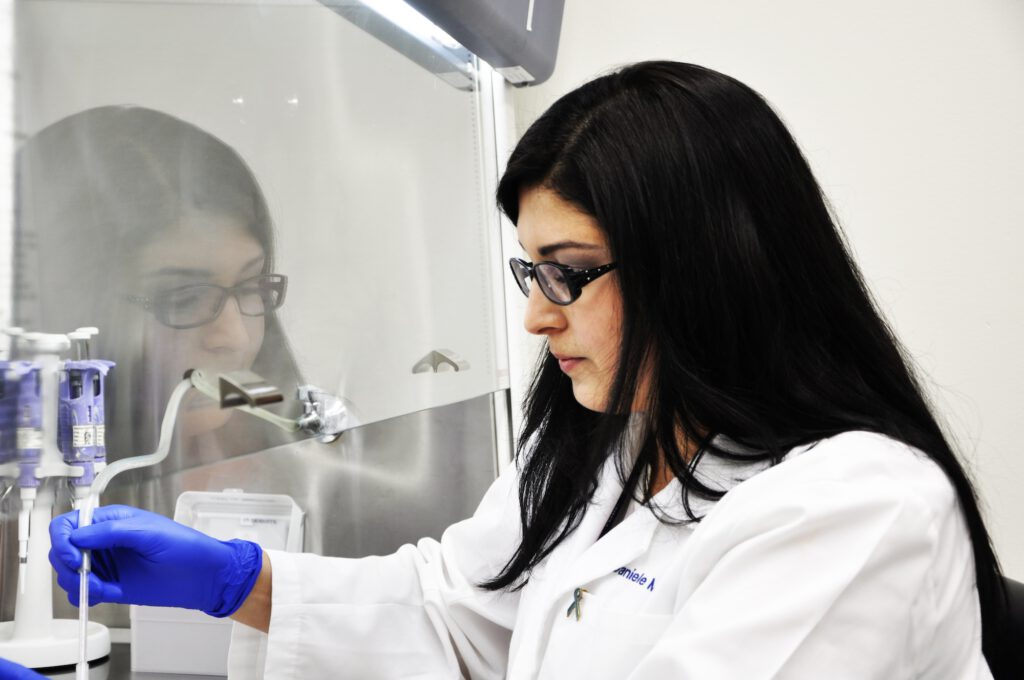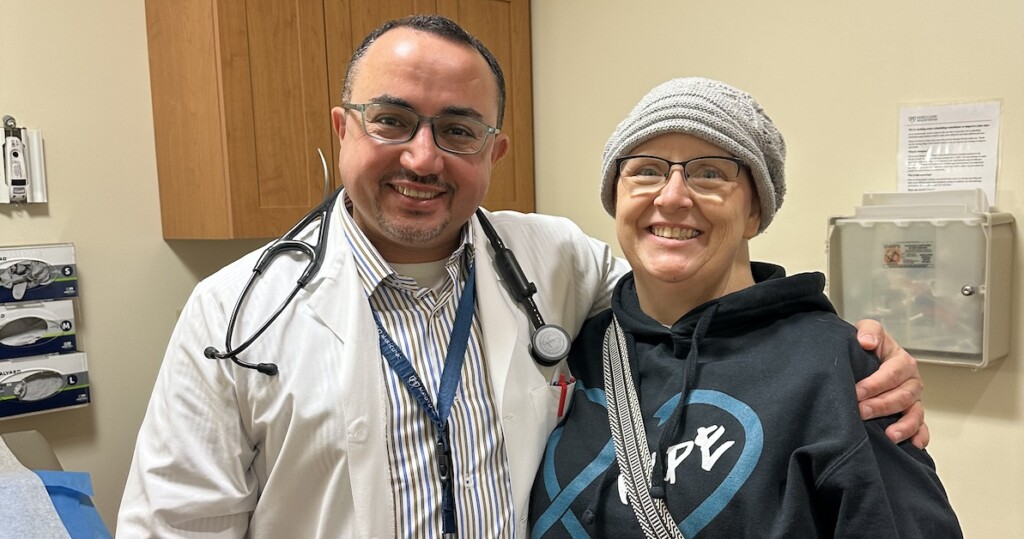
Getting the Best Care
Get guidance on treatment and access resources to make informed decisions.
Learn about clinical trials and explore open trials.


Clinical trials provide patients with access to innovative therapies, and are vital to developing new treatments. OCRA’s Clinical Trial Navigator helps you find trials in the U.S. and Canada tailored to your diagnosis, treatment history, and location. You can search online or choose to speak with a specialist for personalized guidance. Research your options and stay updated on new trial notifications with OCRA’s Clinical Trial Navigator.
If you previously worked with The Clearity Foundation staff on your clinical trial search and would like to do so again, please contact us at support@ocrahope.org.
Clinical trials are carefully controlled research studies designed to test the safety and effectiveness of new treatments, diagnostic tools, and prevention methods. Experimental treatments undergo rigorous scientific evaluation before reaching the clinical trial stage. These trials are strictly regulated to ensure participant eligibility and safety.
Every treatment available today is the result of past clinical trials, yet only about 7.1% of U.S. adults with cancer participate in cancer treatment clinical trials. Clinical trials are not just a “last resort”—patients can join at any stage of their treatment journey, including earlier phases.
Participants in clinical trials always receive either the standard of care treatment or the new treatment being tested; they will never receive only a placebo. This process benefits individual participants who not only gain access to more effective treatments but also allows them to contribute to broader scientific progress.
Ovarian cancer clinical trials focus on different aspects of prevention, diagnosis, treatment, and patient care. The following sections explain the purpose of each type:
Prevention trials test ways to reduce the risk of ovarian cancer. They typically enroll healthy people at high risk for developing ovarian cancer or survivors who want to prevent its return or reduce the chance of developing a new type of cancer.
Screening trials look for ways to detect ovarian cancer at an early stage in healthy people.
Diagnostic trials seek to develop better ways to diagnose and care for patients with ovarian cancer. They usually enroll patients who have already had ovarian cancer or who have signs and symptoms of it. Many of the current diagnostic trials in ovarian cancer focus on proteomics, which involves evaluating the levels of different proteins in the blood.
Treatment trials determine what new treatments or combinations of existing treatments can help patients with ovarian cancer. They evaluate the effectiveness of new treatments or new ways to use existing treatments. (A “treatment” may be a drug, therapy vaccine, surgery, or any combination of these.) Various treatment trials exist, most of which explore the effectiveness of different combinations of surgery and drug therapies in fighting ovarian cancer.
These trials aim to improve the quality of life for ovarian cancer patients, survivors, and their families. These may include issues like side effects from chemotherapy such as neuropathy or nausea, or the need for pain medication.
Usually part of another clinical trial, genetics trials attempt to determine how a woman’s genetic makeup can influence the detection, diagnosis, prognosis, and treatment of ovarian cancer. (Family-based genetic research studies exist that differ from cancer clinical trials; in these studies, multiple high-risk family members may give blood and tissue and agree to be evaluated on an annual basis.)
Clinical trials progress through sequential phases, each with a specific purpose:
Understanding the costs associated with clinical trials is important. Below, you’ll find key details about what expenses might be covered and what you should consider:
The trial sponsor usually covers expenses directly related to the treatment being studied, including the cost of drugs, additional tests, and any doctor visits required by the trial’s protocol.
Routine patient care costs, such as visits to your doctor, hospital stays, and lab tests, are generally the same as if you were not in the trial. However, some insurance plans may not cover these costs, so it’s important to verify coverage with your trial coordinator.
Insurance coverage for clinical trial costs varies based on several factors, including state laws, the trial’s medical necessity, and its phase. Discussing these details with both your insurance provider and the trial coordinator will help you understand what is covered.
Non-profit organizations may provide financial assistance to help cover trial-related expenses. You can find resources and explore available assistance through directories such as the one offered by the National Cancer Institute (NCI).
It is crucial to understand the steps involved in participating in a clinical trial. Below are considerations you need to be aware of. Click on each section to learn more.
Before you can join a clinical trial, your eligibility must be determined. This involves checking specific criteria such as your age, health, treatment history, and the type and stage of your cancer. These criteria ensure that patient safety is maintained and that the trial’s research goals can be met. Different trials have different eligibility requirements and OCRA’s Clinical Trial Navigator is searchable based on these factors.
Before participating, you will receive detailed information about the trial’s purpose, procedures, risks, and benefits. This is known as informed consent. You’ll be asked to sign a document confirming you understand the trial thoroughly. Even after signing the informed consent form, you can choose to leave the trial at any time.
Clinical trials are governed by strict federal rules and local laws to protect your safety. Before a trial begins, it is reviewed by scientific panels and Institutional Review Boards (IRBs) to ensure that the potential benefits outweigh any risks. During the trial, your safety and the accuracy of the data are closely monitored.
Clinical trials can take place in a variety of settings, including doctors’ offices, cancer centers, hospitals, and clinics across the country. Some trials are conducted at a single site, while others occur at multiple locations.
Clinical trials are sponsored by a variety of organizations, including government agencies, medical institutions, foundations, and pharmaceutical companies. These sponsors work together to design and manage the trials, ensuring they are conducted ethically and effectively.
A dedicated research team, including doctors, nurses, and other healthcare professionals, will manage the trial. They will monitor your health, provide care, and ensure that the trial protocol is followed. Your regular healthcare provider will also stay in contact with the research team to coordinate your care.
Once the trial is over, the data collected will be analyzed to determine the results. These findings are often published in peer-reviewed journals and may contribute to new standards of care. Sometimes, important results are shared at scientific meetings before publication.
Exploring all your treatment options is essential when navigating cancer care, and clinical trials might be one of them. While clinical trials aren’t the right fit for everyone, understanding your options empowers you to make informed decisions.
Before joining a clinical trial, it’s crucial to educate yourself about the process and discuss your options with your doctor. Many experts, including those from the National Cancer Institute, recommend asking specific questions to gain clarity and confidence in your decision. These questions can help guide discussions about trial participation and other aspects of your care.
Below, you’ll find key questions to consider for both yourself and your doctor when evaluating clinical trials.
Although many people consider participating in clinical trials only when all other treatments have failed, clinicians recommend finding out about clinical trials as early as possible to have a better understanding of all your treatment options. When exploring future treatment options, it’s recommended that you ask your doctor about both your standard treatment and clinical trial options so you can be fully informed and make the best decision for you.
The idea of clinical trials as a last resort is a common misconception. In fact, a patient may be eligible for a clinical trial at any point in their experience with ovarian cancer — during front line therapy, recurrence, and even survivorship. Many people think of clinical trials as an option for treatment only after other treatments have failed. There are a lot of trials for patients in this situation, but many other trials are available.
For example, trials are conducted for patients who have not yet had surgery. This type of trial might try to find better ways to diagnose ovarian cancer. There are also clinical trials for patients who have just finished their first treatment. These trials may test ways to prevent or delay recurrence. In addition, patients who do not have ovarian cancer, but may be at high risk because of a family history of the disease, can also take part in trials focused on ways to prevent it.
Unfortunately, many physicians do not know about clinical trials that may be available to their patients, or they may be concerned about how their patients will react if they bring up clinical trials. It is up to you to ask about trials if your doctor did not mention them. There may not be appropriate clinical trials for you, but it does no harm to explore the options with your doctor, just as you would ask about other aspects of your care. You can look for a trial with our Clinical Trial Navigator.
What other options are available? Under certain circumstances someone might be able to obtain experimental treatments, also called investigational new drugs, if they cannot participate in a clinical trial. The Food and Drug Administration allows manufacturers of investigational new drugs to provide the agents to someone with a serious disease who might benefit from the treatment under what is called “expanded access.” Also, someone might be ineligible for one trial, but be eligible for another one.
Absolutely not. Clinical trial participants are either given the “standard of care,” which is the best treatment available for their type of ovarian cancer, or receive the new treatment that is being tested. Placebos may be used in situations where the new treatment being tested is an “add on” to the standard of care or if there is no standard of care.
For example, there are clinical trials that look at whether extra chemotherapy after the standard first-line course of treatment improves a patient’s health. In this kind of trial, a placebo would be used, but all patients receive the best treatment available first. In addition to that standard treatment, some patients would receive placebos and others would get additional chemotherapy.
Not necessarily. A major institution may be a coordinator of a clinical trial but under its auspices may have local physicians and community hospitals working with patients, too. Many cancer clinical trials take place at local hospitals. Some also take place at local cancer clinics and doctor’s offices.
Not all insurance companies cover the patient care costs, such as costs for additional medical tests associated with clinical trials, but many do. What is covered varies by health plan and by study. Under the Affordable Care Act, insurers are prohibited from dropping or limiting coverage because you choose to participate in a clinical trial. If you find a trial in which you want to participate, ask your doctor or the office’s research nurse to help you determine what your insurance covers. In many studies, the costs not covered by insurance will be paid by the study. (Note that extra costs associated with travel to additional appointments or daycare are typically not covered, but are in some cases.)
For example, all clinical trials that are conducted at the National Cancer Institute’s (NCI) campus in Bethesda, MD, provide reimbursement for travel from anywhere in the United States for participating patients. More information about insurance coverage can be found in the NCI’s resource: Clinical Trials and Insurance Coverage: A Resource Guide.
Yes. Medicare has been covering patient care costs of clinical trials since June 2000.
All eligible participants must be able to provide “informed consent” before they decide to participate in a clinical trial. This is your right as a clinical trial participant. Before you give your consent, you will be told all the facts about the study including any risks and benefits that might be experienced.
Some trials may present more risks than others and each person should discuss them with their doctor before making a decision to participate. In addition, if new risks or side effects come up as more patients enroll in the study, you will be informed of this as well.
Yes. You have the right to leave a cancer clinical trial at any time for any reason, without giving up access to other treatment, but you should inform the research team about the reasons you are doing so.
Patients may not consider clinical trials because they…
In addition, doctors may not recommend clinical trials because they …
Informed consent is intended to protect participants in the trial by providing a full explanation of the trial along with the voluntariness, possible risks, benefits, and privacy protections involved with participation. Informed consent does not require you to give up your right to protection if the medical team is negligent or does something wrong.
Randomization is the process by which the participant is assigned in a completely random manner. This process may be used in trials that compare several treatment regimens or several doses of the same drug (e.g., trials with multiple arms). Besides randomization, a clinical trial is usually blinded, meaning that neither the participant nor the doctor treating you knows who is getting which treatment so the results of the trial are unbiased.
Clinical trials often test treatments, but they also study new diagnostics, screening methods, prevention measures, and quality of life improvements, such as ways to reduce the side effects of treatment.

Get guidance on treatment and access resources to make informed decisions.

Locate gynecologic oncologists, specialists, and treatment centers in your area.

Treatment can bring up lots of questions and concerns. We have answers and up-to-date information.
Get email updates about research news, action alerts, and ways to join the fight.